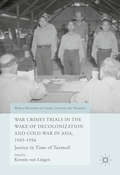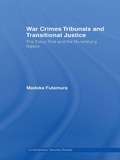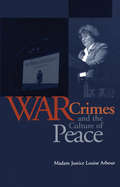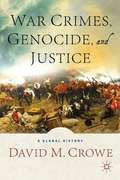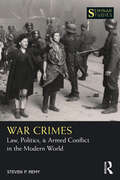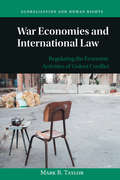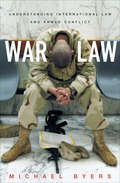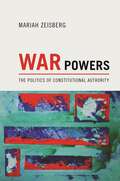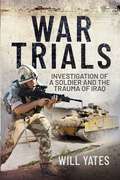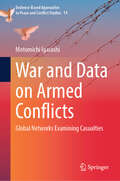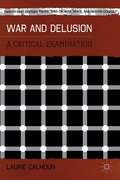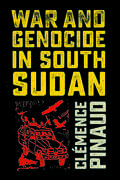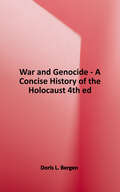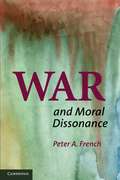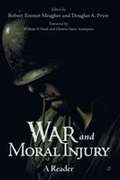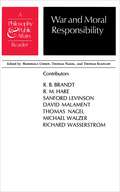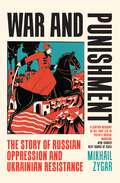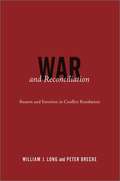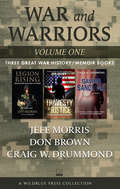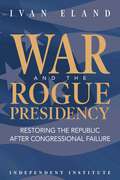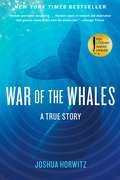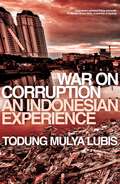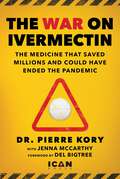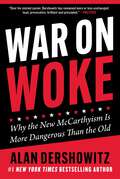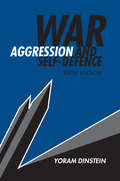- Table View
- List View
War Crimes Trials in the Wake of Decolonization and Cold War in Asia, 1945-1956: Justice In Time Of Turmoil (World Histories of Crime, Culture and Violence)
by Kerstin Von LingenThis book investigates the political context and intentions behind the trialling of Japanese war criminals in the wake of World War Two. After the Second World War in Asia, the victorious Allies placed around 5,700 Japanese on trial for war crimes. Ostensibly crafted to bring perpetrators to justice, the trials intersected in complex ways with the great issues of the day. They were meant to finish off the business of World War Two and to consolidate United States hegemony over Japan in the Pacific, but they lost impetus as Japan morphed into an ally of the West in the Cold War. Embattled colonial powers used the trials to bolster their authority against nationalist revolutionaries, but they found the principles of international humanitarian law were sharply at odds with the inequalities embodied in colonialism. Within nationalist movements, local enmities often overshadowed the reckoning with Japan. And hovering over the trials was the critical question: just what was justice for the Japanese in a world where all sides had committed atrocities?
War Crimes Tribunals and Transitional Justice: The Tokyo Trial and the Nuremburg Legacy
by Madoka FutamuraAdvocates of theNuremberg legacy emphasize the positive impact of the individualization of responsibility and the establishment of an historical record through judicial procedures forwar crimes. This legacy has been cited in the context of the establishment and operation of the UN ad hoc International Criminal Tribunals in the 1990s, as well
War Crimes and the Culture of Peace
by Madam Justice Louise ArbourIn 1996, Louise Arbour was appointed by the Security Council of the United Nations as Chief Prosecutor for the International Criminal Tribunals for the former Yugoslavia and Rwanda. Reflecting on these experiences, she argues in War Crimes and the Culture of Peace that the level of public awareness and understanding of the significance of these events is minimal in part as a result of the way in which international criminal law is practiced. Justice Arbour contends that previous efforts to unite concepts of international law and criminal law in the practice of these tribunals are evolving, and suggests that the ties between personal criminal accountability and peace should be central to the decisions made in the future concerning procedural models for the permanent International War Crimes Tribunals. As a result, the public might better understand the context and causes of such crime, and the notion of crime as a breach of the peace would be made central to these trials. Justice Arbour delivered War Crimes and the Culture of Peace as the fifth annual Senator Keith Davey Lecture at Victoria University at the University of Toronto in January 2001.
War Crimes, Genocide, And Justice
by David M. CroweIn this sweeping, definitive work, historian David Crowe offers an unflinching account of the long and troubled history of genocide and war crimes. From ancient atrocities to more recent horrors, he traces their disturbing consistency but also the heroic efforts made to break seemingly intractable patterns of violence and retribution.
War Crimes: Law, Politics, & Armed Conflict in the Modern World (Seminar Studies)
by Steven P. RemyThis book is a concise and accessible introduction to the problem of war crimes in modern history, emphasizing the development of laws aimed at regulating the conduct of armed conflict developed from the 19th century to the present. Bringing together multiple strands of recent research in history, political science, and law, the book starts with an overview of the attempts across the pre-modern world to regulate the initiation, conduct, and outcomes of war. It then presents a survey of the legal revolution of the 19th century when, amidst a global welter of colonial wars, the first body of formal codes and laws relating to distinguishing legal from criminal conduct in war was developed. Further chapters investigate failed but influential attempts to develop the laws of war in the post-World War I period and summarize the major landmarks in international law related to war crimes, such as the Hague conventions and the Nuremberg and Tokyo trials, as well as hundreds of lesser-known post-World War II trials in Europe and Asia. It also looks at the origins and debated significance of the Genocide Convention of 1948 and the 1949 Geneva Conventions, accounts for the acceleration worldwide of war crimes investigations and trials from the 1970s into the 2000s, and summarizes current thinking about international law and the rapidly changing nature of warfare worldwide as well as the memorialization of war crimes. Including images, documents, a bibliography highlighting the most recent scholarship, a chronology, who’s who, and a glossary, this is the perfect introduction for those wishing to understand the complex field or war crimes history and its politics.
War Economies and International Law: Regulating the Economic Activities of Violent Conflict (Globalization and Human Rights)
by Mark B. TaylorEconomic activity continues during war. But what rules apply when US troops occupy Syrian oil fields? Who is responsible when multinational companies use minerals extracted by child labourers in war zones? This book examines how international law regulates the war economies that are at the heart of strategic competition between great powers and help sustain the irregular warfare in today's war zones. Drawing on advances in our understanding of the social and economic dynamics in war zones, this book identifies predation, a combination of violence and economic opportunity, as the core pathology of war economies. The author presents a framework for understanding the regulation of war economies based on the history of international law and existing norms of international humanitarian law, international criminal law, international human rights law and the law of international peace and security. War Economies and International Law concludes that the pathologies of predation in war demand answers based on an international regulatory strategy.
War Law: Understanding International Law and Armed Conflict
by Michael ByersInternational law governing the use of military force has been the subject of intense public debate. Under what conditions is it appropriate, or necessary, for a country to use force when diplomacy has failed? Michael Byers, a widely known world expert on international law, weighs these issues in War Law.Byers examines the history of armed conflict and international law through a series of case studies of past conflicts, ranging from the 1837 Caroline Incident to the abuse of detainees by U.S. forces at Abu Ghraib prison in Iraq. Byers explores the legal controversies that surrounded the 1999 and 2001 interventions in Kosovo and Afghanistan and the 2003 war in Iraq; the development of international humanitarian law from the 1859 Battle of Solferino to the present; and the role of war crimes tribunals and the International Criminal Court. He also considers the unique influence of the United States in the evolution of this extremely controversial area of international law.War Law is neither a textbook nor a treatise, but a fascinating account of a highly controversial topic that is necessary reading for fans of military history and general readers alike.
War Powers: The Politics of Constitutional Authority
by Mariah ZeisbergArmed interventions in Libya, Haiti, Iraq, Vietnam, and Korea challenged the US president and Congress with a core question of constitutional interpretation: does the president, or Congress, have constitutional authority to take the country to war? War Powers argues that the Constitution doesn't offer a single legal answer to that question. But its structure and values indicate a vision of a well-functioning constitutional politics, one that enables the branches of government themselves to generate good answers to this question for the circumstances of their own times. Mariah Zeisberg shows that what matters is not that the branches enact the same constitutional settlement for all conditions, but instead how well they bring their distinctive governing capacities to bear on their interpretive work in context. Because the branches legitimately approach constitutional questions in different ways, interpretive conflicts between them can sometimes indicate a successful rather than deficient interpretive politics. Zeisberg argues for a set of distinctive constitutional standards for evaluating the branches and their relationship to one another, and she demonstrates how observers and officials can use those standards to evaluate the branches' constitutional politics. With cases ranging from the Mexican War and World War II to the Cold War, Cuban Missile Crisis, and Iran-Contra scandal, War Powers reinterprets central controversies of war powers scholarship and advances a new way of evaluating the constitutional behavior of officials outside of the judiciary.
War Trials: Investigation of a Soldier and the Trauma of Iraq
by Will YatesWar Trials tells the gripping and in-depth true story of a British soldier’s role in the drowning of an Iraqi teenager in May 2003, the devastating investigation and resulting court martial. This narrative non-fiction tracks the soldier’s life from tight-knit broken family home in Merseyside through deadly urban conflict in the Middle East, to a different battle fought against PTSD while he awaited a military tribunal back in the UK. The military court case in 2006 marked the first of its kind relating to the Iraq war and a case that opened the flood gates of multiple investigations and inquiries into the conduct of soldiers overseas. Based upon rigorous new research, this book’s untold personal story explores the horrors of battle and the chaos of a post-war city and a young soldier’s struggle against depression, suicide attempts and deep sense of being let down by the army he sought to serve. This soldier would eventually endure numerous investigations and face the threat of the International Criminal Court for war crimes but these are the shocking events that started it all. It is the compelling story of a contentious military campaign with little preparation for the disastrous fall out; the soldiers pushed to the limit who maintained a wall of a silence after doing the unthinkable; and a floating body of dead child who came to symbolize a generation lost to war.
War and Data on Armed Conflicts: Global Networks Examining Casualties (Evidence-Based Approaches to Peace and Conflict Studies #14)
by Motomichi IgarashiThis book is the first to provide a comprehensive examination of the entities responsible for the production of data on armed conflicts (DAC), the processes by which it is generated, and the international norms that govern it. While numerous studies have focused on the statistical aspects of armed conflicts, this book distinguishes itself through its historical analysis of the relationship between actors, data generation methods, and international norms. The book begins with an examination of the nature of data in international politics. The vast scale of the subjects being analyzed presents significant challenges to accurately measuring international political data, with war being particularly difficult to assess. This raises the question of how DAC has been structured and generated. The book highlights the existence of specific international norms as a basis for DAC. It explores the history of international norms for the protection of war dead in collecting casualty information, as well as norms for civilian protection. The book posits that DAC has been generated not only by sovereign states but also by global networks comprising international organizations and NGOs. It thus analyzes the historical development of such global networks. In the latter part of the book, the methods by which global networks generate DAC are analyzed. First, it clarifies when and how statistical analysis has been used in generating DAC. Second, it elucidates when and how forensic analysis, primarily of corpses, has been employed. Thirdly, the book reveals when and how chemical weapons analysis has been utilized. This book offers a valuable investigation into the generative structure of DAC and mechanisms for ensuring compliance with international humanitarian law. It will appeal to a broad audience of policymakers, human rights activists, humanitarian practitioners, and academics.
War and Delusion
by Laurie CalhounCalhoun examines the centuries-old paradigm of just war theory to determine whether modern 'just war' rationalizations constitute sound justifications or pro-military propaganda. Her work reveals how the practice of modern war contradicts the most basic values and principles of modern Western democracies.
War and Genocide in South Sudan
by Clémence PinaudUsing more than a decade's worth of fieldwork in South Sudan, Clémence Pinaud here explores the relationship between predatory wealth accumulation, state formation, and a form of racism—extreme ethnic group entitlement—that has the potential to result in genocide. War and Genocide in South Sudan traces the rise of a predatory state during civil war in southern Sudan and its transformation into a violent Dinka ethnocracy after the region's formal independence. That new state, Pinaud argues, waged genocide against non-Dinka civilians in 2013-2017. During a civil war that wrecked the region between 1983 and 2005, the predominantly Dinka Sudan People's Liberation Army (SPLA) practiced ethnically exclusive and predatory wealth accumulation. Its actions fostered extreme group entitlement and profoundly shaped the rebel state. Ethnic group entitlement eventually grew into an ideology of ethnic supremacy. After that war ended, the semi-autonomous state turned into a violent and predatory ethnocracy—a process accelerated by independence in 2011. The rise of exclusionary nationalism, a new security landscape, and inter-ethnic political competition contributed to the start of a new round of civil war in 2013, in which the recently founded state unleashed violence against nearly all non-Dinka ethnic groups. Pinaud investigates three campaigns waged by the South Sudan government in 2013–2017 and concludes they were genocidal—they sought to destroy non-Dinka target groups. She demonstrates how the perpetrators' sense of group entitlement culminated in land-grabs that amounted to a genocidal conquest echoing the imperialist origins of modern genocides.Thanks to generous funding from TOME, the ebook editions of this book are available as Open Access volumes from Cornell Open (cornellopen.org) and other repositories.
War and Genocide: A Concise History of the Holocaust, Fourth Edition
by Doris L. BergenIn examining one of the defining events of the twentieth century, Doris L. Bergen situates the Holocaust in its historical, political, social, cultural, and military contexts. Unlike many other treatments of the Holocaust, this revised, fourth edition discusses not only the persecution of Jews, but also other groups targeted by the Nazis: people with disabilities, Roma, queer people, Poles in leadership positions, Soviet POWs, and others deemed unwanted. In clear and eloquent prose, Bergen explores the two interconnected goals that drove the Nazi German program of conquest and genocide—purification of the so-called Aryan race and expansion of its living space—and invites readers to reflect on how the Holocaust connects to histories of violence around the world. Replete with firsthand accounts from victims, survivors, and eyewitnesses, this book is immediate, human, and eminently readable.
War and Moral Dissonance
by Peter A. FrenchThis collection of essays, inspired by the author's experience teaching ethics to Marine and Navy chaplains during the Iraq War, examines the moral and psychological dilemmas posed by war. The first section deals directly with Dr Peter A. French's teaching experience and the specific challenges posed by teaching applied and theoretical ethics to men and women wrestling with the immediate and personal moral conflicts occasioned by the dissonance of their duties as military officers with their religious convictions. The following chapters grew out of philosophical discussions with these chaplains regarding specific ethical issues surrounding the Iraq War, including the nature of moral evil, forgiveness, mercy, retributive punishment, honour, torture, responsibility and just war theory. This book represents a unique viewpoint on the philosophical problems of war, illuminating the devastating toll combat experiences take on both an individual's sense of identity and a society's professed moral code.
War and Moral Injury: A Reader
by Robert Emmet Meagher Douglas A. PryerMoral Injury has been called the "signature wound" of today's wars. It is also as old as the human record of war, as evidenced in the ancient war epics of Greece, India, and the Middle East. But what exactly is Moral Injury? What are its causes and consequences? What can we do to prevent or limit its occurrence among those we send to war? And, above all, what can we do to help heal afflicted warriors? This landmark volume provides an invaluable resource for those looking for answers to these questions. Gathered here are some of the most far-ranging, authoritative, and accessible writings to date on the topic of Moral Injury. Contributors come from the fields of psychology, theology, philosophy, psychiatry, law, journalism, neuropsychiatry, classics, poetry, and, of course, the profession of arms. Their voices find common cause in informing the growing, international conversation on war and war's deepest and most enduring invisible wound. Few may want to have this myth-challenging, truth-telling conversation, but it is one we must have if we truly wish to help those we send to fight our wars.
War and Moral Responsibility: A Philosophy and Public Affairs Reader (Philosophy And Public Affairs Readers Ser.)
by Thomas Nagel Marshall Cohen Thomas ScanlonThis remarkably rich collection of articles focuses on moral questions about war. The essays, originally published in Philosophy & Public Affairs, cover a wide range of topics from several points of view by writers from the fields of political science, philosophy, and law. The discussion of war and moral responsibility falls into three general categories: problems of political and military choice, problems about the relation of an individual to the actions of his government, and more abstract ethical questions as well. The first category includes questions about the ethical and legal aspects of war crimes and the laws of war; about the source of moral restrictions on military methods or goals; and about differences in suitability of conduct which may depend on differences in the nature of the opponent. The second category includes questions about the conditions for responsibility of individual soldiers and civilian officials for war crimes, and about the proper attitude of a government toward potential conscripts who reject its military policies. The third category includes disputes between absolutist, deontological, and utilitarian ethical theories, and deals with questions about the existence of insoluble moral dilemmas.
War and Punishment: The Story of Russian Oppression and Ukrainian Resistance
by Mikhail Zygar'History is made up of myths,' writes the renowned Russian dissident journalist Mikhail Zygar. 'Alas, our myths led us to the fascism of 2022. It is time to expose them.' Drawing from his perilous career investigating the frontiers of the Russian empire, Zygar reveals how 350 years of propaganda, bad historical scholarship, folk tales and fantasy spurred his nation into war with Ukraine.How did a German monk's fear of the Ottoman Empire drive him to invent the fiction of a united Russian world? How did corny spy novels about a 'Soviet James Bond' inspire Vladimir Putin to join the KGB? How did Alexander Pushkin's admiration for a poem by Lord Byron end with him slandering the legendary chief of the Cossacks? And how did Putin underestimate a rising TV comic named Volodymyr Zelensky, failing to see that his satire had become deadly serious, and that his country would be a joke no longer?A noted expert on the Kremlin with unparalleled access to hundreds of players in the current conflict - from politicians to oligarchs, gangsters to comedians (not least Zelensky himself) - Zygar chronicles the power struggles from which today's politics grew, and digs out the essential truths from behind layers of seductive legend. By surveying the strange, complex record of Russo-Ukrainian relations, War and Punishment reveals exactly how the largest nation on Earth lost its senses. A work of history can't undo the past or transform the present, but sometimes it can shape the future.In fact, that's how the story begins.
War and Reconciliation: Reason and Emotion in Conflict Resolution
by William J. Long Peter BreckeThis book is the first systematic examination of the impact of reconciliation on restoring and maintaining peace following civil and international conflicts. Through eleven comparative case studies of civil war and eight of international conflict, it constructs a surprising explanation for when and why reconciliation restores social order. The civil war cases reveal that successful reconciliation is associated with a process of national forgiveness, not merely negotiated settlement. All successful cases followed a four-step pattern of public truth telling, justice short of revenge, redefinition of the identities of former belligerents, and a call for a new relationship. The book argues that success is not solely the result of rational choice decision making. It proposes a hypothesis, grounded in evolutionary psychology, that to restore social order we use emotional/cognitive techniques that have evolved to ensure human survival. On the international level, however, successful reconciliation was not a part of a forgiveness process. Reconciliation was successful in bringing about sustained peace when it was associated with a signaling process -- an exchange of costly, novel, voluntary, and irrevocable concessions in a negotiated bargain. This result is consistent with realist notions of the limits of international society and illustrates the context in which a rational choice model is appropriate. The book's approach, integrating emotion with reasoning and linking political science to scientific research in other disciplines, particularly biology and neuroscience, has broad implications for social science theory.
War and Warriors Volume One: Legion Rising, Travesty of Justice, Saving Sandoval (War and Warriors #1)
by Don Brown Jeff Morris Craig W. DrummondThree real-life accounts of the struggles of American soldiers from the Iraq and Afghanistan battlefields to, in two cases, US military tribunals. Legion Rising: Surviving Combat and the Scars It Left Behind by Jeff Morris Follow Jeff through up-close, fast-paced accounts of the thrills and dangers of combat as a Platoon Leader in Iraq. Feel the weight of the gruesome and tragic loss of eight men whose lives were taken in the line of duty. Journey through his battle to face the scars and shadows that followed him long after his time serving in the military was over. Travesty of Justice: The Shocking Prosecution of Lt. Clint Lorance by Don BrownThe Book That Won a Presidential Pardon! On July 2, 2012, three Afghan males crowded on a motorcycle and sped down a Taliban-controlled dirt road toward Lt. Clint Lorance&’s men. In a split-second decision, Lorance ordered his men to fire. When no weapons were found on the Afghan bodies, the Army prosecuted Lorance for murder. &“The most powerful case to date for the exoneration of imprisoned Army Lt. Clint Lorance.&” —Sun-Sentinel Saving Sandoval by Craig W. Drummond While deployed in Iraq, Sandoval, an airborne infantryman and elite sniper, was instructed to &“take the shot&” and kill an enemy insurgent wearing civilian clothes. Two weeks later, Army Criminal Investigation Command descended upon Sandoval&’s unit, trying to link Sandoval and others to war crimes, including murder. &“A revealing, real-life courtroom drama, reminiscent of A Few Good Men.&” —Hunter R. Clark, International Law and Human Rights Program and Drake University Law School
War and the Rogue Presidency: Restoring the Republic after Congressional Failure
by Ivan ElandIn War and the Rogue Presidency, Ivan Eland shows that almost immediately after the nation&’s founding, starting with the first presidency of George Washington, the executive&’s role in defense and foreign policy began expanding past what the framers of the Constitution had envisioned.The Constitution enshrined Congress as the dominant branch of government, giving Congress, not the President, most of the powers in defense and foreign policy. This comprehensive book shows how the presidential aggrandizement of greater powers has only been possible because of congressional abdication. However, this expansion of the executive&’s role was still relatively contained until the Cold War when undeclared, permanent war became ongoing policy, and then the post-9/11 war on terror dramatically expanded the President&’s role. Such expansion has had deleterious effects on U.S. foreign policy abroad, as well as a major erosion of the republic, its security at home, and the liberties of American citizens. War and the Rogue Presidency is an in-depth examination of the history of the congressional-executive tug-of-war over U.S. security policy and why reclaiming constitutional standards is essential to restore both an effective national defense and civil and economic liberties. To get Congress to do that, Dr. Eland presents ways in which internal congressional incentives could be changed to provide motivation for legislative pushback. As a result, the book suggests important actions Congress could take for such a pushback along with other reforms that would effectively rein in the rogue presidency.
War of the Whales
by Joshua HorwitzTwo men face off against an all-powerful navy--and the fate of the ocean's most majestic creatures hangs in the balance."A gripping, brilliantly told tale of the secret and deadly struggle between American national security and the kings of the oceans."--Bob WoodwardWar of the Whales is the gripping tale of a crusading attorney who stumbles on one of the US Navy's best-kept secrets: a submarine detection system that floods entire ocean basins with high-intensity sound--and drives whales onto beaches. As Joel Reynolds launches a legal fight to expose and challenge the Navy program, marine biologist Ken Balcomb witnesses a mysterious mass stranding of whales near his research station in the Bahamas. Investigating this calamity, Balcomb is forced to choose between his conscience and an oath of secrecy he swore to the Navy in his youth. When Balcomb and Reynolds team up to expose the truth behind an epidemic of mass strandings, the stage is set for an epic battle that pits admirals against activists, rogue submarines against weaponized dolphins, and national security against the need to safeguard the ocean environment. Waged in secret military labs and the nation's highest court, War of the Whales is a real-life thriller that combines the best of legal drama, natural history, and military intrigue.
War on Corruption: An Indonesian Experience
by Todung Mulya LubisFor Indonesian society, corruption remains a huge problem. Some of the reasons for this are easy to identify, flowing on from the authoritarianism of the Soeharto New Order (1966-1998). Other factors are less well known and less able to be easily intuited. As Todung Mulya Lubis, one of Indonesia's leading human rights lawyers and most influential legal thinkers, explains, 'Now corruptors come from the legislature, government, judiciary, and business communities, and they are not simply thieves but rent-seekers, benefiting from rapid economic development and weak law enforcement'. In Todung's telling, the best efforts of the most unswerving and talented Indonesian opponents of corruption have been frustrated since the epochal overturning of the Soeharto regime a generation ago. This story, however, is not without flashes of illumination. As Todung also shows, in recent decades there have been very many successful prosecutions of corrupt government and state officials, from the lowest levels to the very upper echelons of society. The creation of the Indonesian Corruption Eradication Commission, the KPK, in 2003, was an inspired move. For all its problems, arising from both internal dynamics and the often hostile social and institutional environments in which it has operated, the legal independence and dogged idealism of the KPK have made it a genuine force for renewal. War on Corruption: An Indonesian Experience, is a courageous, informed, and sober insider's account of the challenge for democracy and the rule of law within this fourth largest nation, by population, and vital participant in world affairs.
War on Ivermectin: The Medicine that Saved Millions and Could Have Ended the Pandemic
by Pierre Kory Jenna McCarthyBig Pharma and health agencies cry, &“Don&’t take ivermectin!&” A media storm follows. Why then, does the science say the opposite?&” Ivermectin is a dirty word in the media. It doesn&’t work. It&’s a deadly horse dewormer. Prescribe or promote it and you&’ll be called a right-wing quack, be banned from social media, or lose your license to practice medicine. And yet, entire countries wiped out the virus with it, and more than ninety-five studies now show it to be unequivocally effective in preventing and treating Covid-19. If it didn&’t work, why was there a coordinated global campaign to cancel it? What&’s the truth about this decades-old, Nobel Prize-winning medication? The War on Ivermectin is the personal and professional narrative of Dr. Pierre Kory and his crusade to recommend a safe, inexpensive, generic medicine as the key to ending the pandemic. Written with Jenna McCarthy, Dr. Kory&’s story chronicles the personal attacks, professional setbacks, and nefarious efforts of the world&’s major health agencies and medical journals to dismiss and deny ivermectin&’s efficacy. Part personal narrative, part scathing expose, The War on Ivermectin highlights the catastrophic impacts of the mass media censorship and relentless propaganda that led to the greatest humanitarian crisis in history. Although numerous studies and epidemiologic data have shown that millions of lives were saved globally with the systematic use of ivermectin, many more millions perished. This carnage was the direct result of what Dr. Kory eventually discovered to be the pharmaceutical industry&’s silent but deadly war on generic medicines and the corrupt, captured medical and media systems that allow it to continue. For anyone who thought Covid-19 was the enemy, Dr. Kory&’s book will leave no doubt that the true adversary in this war is a collective cabal of power-hungry elites who put profits over people and will stop at nothing in their quest for control.The War on Ivermectin is published through ICAN PRESS, an imprint of Skyhorse Publishing. ICAN (Informed Consent Action Network) is a nonprofit organization investigating the safety of medical procedures, pharmaceutical drugs, and vaccines while advocating for people&’s right to informed consent.
War on Woke: Why the New McCarthyism Is More Dangerous Than the Old
by Alan DershowitzIn War on Woke: Why the New McCarthyism Is More Dangerous Than the Old, Alan Dershowitz—#1 New York Times bestselling author and one of America&’s most respected legal scholars—warns of the danger to the future of civil liberties and equality in America. Alan Dershowitz has been called &“one of the most prominent and consistent defenders of civil liberties in America&” by Politico and &“the nation&’s most peripatetic civil liberties lawyer and one of its most distinguished defenders of individual rights&” by Newsweek. War on Woke exposes new McCarthyite tendencies and tactics of academia, the media, and the business community, especially high tech, that promote closed-minded intolerance. Dershowitz explains that the new woke McCarthyism challenges the basic tenets of the classic liberal (in the traditional sense) state: Freedom of expression; due process; presumption of innocence, right to counsel, equal application of the law; tolerance and respect for differing viewpoints, and that these bedrock principles are rejected by McCarthyite extremists on both the hard left and the hard right. Analyzing the impact of this new woke McCarthyism through the relentless attempts to &“get&” Trump, the attention on the Bidens, and even its international manifestation relative to anti-Semitism, Israel, and the world, Dershowitz investigates the role of media and asks whether the US Supreme Court can constrain this growing threat as new woke McCarthyism becomes mainstream Americanism—especially as the current generation of students and young professionals become our political, media, business, educational, religious, and &“influencer&” leaders.
War, Aggression and Self-Defence
by Yoram DinsteinYoram Dinstein's seminal textbook is an essential guide to the legal issues of war and peace, armed attack, self-defence and enforcement measures taken under the aegis of the Security Council. This third edition incorporates new material on the Kosovo air campaign, 'humanitarian intervention', recent resolutions adopted by the Security Council, the latest pronouncements of the International Court of Justice and the International Criminal Tribunal for the former Yugoslavia. Also discussed are new treaties including the 1998 Rome Statute on the International Criminal Court and current studies of the International Law Commission. In addition, supplementary sections consider, for example, enforcement action carried out by regional organizations under the authority of the Security Council. War, Aggression and Self-Defence remains a comprehensive and highly readable introduction to the legal issues surrounding war and self-defence, and continues to provide an indispensable tool for students and practitioners of international law, international relations and military studies.
